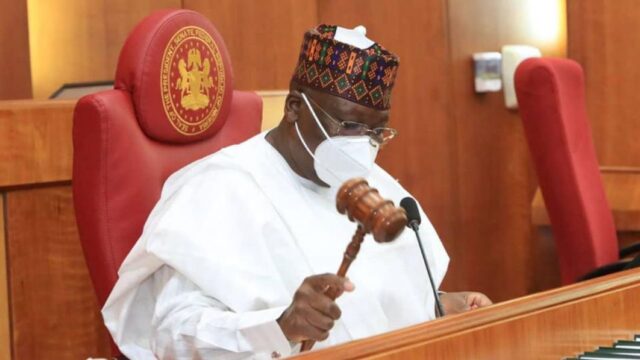
The Senate, yesterday, approved President Muhammadu Buhari’s request for ongoing external loans to the tune of $8,325,526,537 and €490,000,000 (Euros) under the 2018-2020 External Borrowing (Rolling) Plan. The approval followed the consideration of a report on the 2018-2020 External Borrowing (Rolling) Plan by the Committee on Local and Foreign Debt.
Nigeria’s debt profile has continued to rise as the government continues to seek borrowings to meet annual budget deficits. According to the Debt Management Office (DMO), Nigeria’s total public debt stock stood at N32.92 trillion ($86.39 billion) in 2020, compared to N27.40 trillion ($84.05 billion) in 2019, representing an increase of 20.12 per cent in Naira terms.
This has, however, moved to N33.107 trillion as of March 31, 2021, and excludes the Senate’s previous approval of the Federal Government’s borrowing of $2.18 billion in May, $6.1 billion last week, and another $8.3 billion-plus €490 million yesterday.
Chairman of the Committee, Senator Clifford Ordia, in his presentation, said the Committee noted with utmost importance, the genuine and very serious concerns of Nigerians about the level and sustainability/serviceability of the country’s borrowings in the last decade.
According to the lawmaker, “Nigeria’s debt service figures constitute a huge drain on our revenue to the extent that it accounts for over 30 per cent of our expenditure in the annual budget.”
He explained that due to the shortfall in the country’s yearly revenues in relation to the need for rapid infrastructural and human capital development, “we have had to pass deficit budget every year, requiring us to borrow to finance the deficit in our budget.”
Ordia noted that out of the total borrowing request of $36,837,281,256 contained in the re-forwarded request of Mr. President, a sum of $26,154,536,533 is for funds proposed to be borrowed from various financial institutions from the Peoples Republic of China.
He stressed that the proposed projects are domiciled in the Ministries of Transportation, FCT, Aviation, Works & Housing, Agriculture and Water Resources and some commissions such as National Universities Commission, North East Development Commission and the National Identity Management Commission, and they are mostly ongoing projects and programmes in respect of which externally borrowed funds have been spent in the past, including loans.
“These projects have a great multiplier effect on stimulating economic growth through infrastructure development, job creation and poverty alleviation, stimulation of commercial and engineering activities and the consequent tax revenues payable to government as a result of these productive activities,” Ordia explained.
The funding agencies are: World Bank – $796,000,000; China Exim Bank – $2,901,026,509; Industrial Commercial Bank of China – $2,484,555,304; African Development Bank -$104,200,000; Africa Growi ng Together Fund – $20,000,000; French Development Agency – €240,000,000; European Investment Bank – 250,000,000; European ECA/KfW/IPEX/AFC – $1,959,744,724; and International Fund For Agricultural Development (IFAD) – $60,000,000.
MEANWHILE, the Federal Government has projected to spend N17.8 trillion on servicing debt between 2021 and 2024. This represents 47.6 per cent or N37.42 trillion expected revenue within the four-year period.
By implication, for every N100 earned, the Federal Government would spend about N48 to repay debt. This is contained in the 2022-2024 medium-term expenditure framework and fiscal strategy paper (MTEF & FSP) released by the Budget Office of the federation.
The increase in the total public debt stock is largely due to new domestic and external borrowing by the federal and sub-national governments and additional disbursements on existing multilateral and bilateral loans.
In 2020, out of the Federal Government’s total revenue of N3.42 trillion, N3.34 trillion was used for debt servicing. This implies that for every N100 earned as revenue, N97 was spent on debt servicing during the period under review.
According to the DMO, the debt stock also included promissory notes in the sum of N940.220 billion issued to settle the inherited arrears of the Federal Government to state governments, oil marketing companies, exporters and local contractors.
The MTEF & FSP is a major feature of the annual budget preparation cycle, which provides the basic structure for the estimates and assumptions that underlie the annual budgets. According to the document, N3.12 trillion will be provided for servicing debts in 2021 based on the budget passed by the National Assembly with an oil benchmark price of $40 per barrel.
In 2022, the Federal Government projects that N3.61 trillion will be expended on debt servicing. The figure is expected to rise to N4.93 trillion by 2023, while N6.17 trillion will be used to service part of Nigeria’s debt in 2024.
This implies that Nigeria’s debt service is projected to rise by 97 per cent in 2024 (N6.17 trillion) from N3.12 trillion in 2021. During the period, revenue from oil and non-oil sources is projected to reach N37.42 trillion between 2021 and 2024.
According to the document, the government projects that revenue, including from the sale of government-owned entities will hit N7.98 trillion in 2021, N8.36 trillion in 2022, N10.18 trillion in 2023 and N10.9 trillion in 2024. The represents 39 per cent debt to revenue ratio in 2021, 43 per cent in 2022, 48 per cent in 2023 and 56 per cent in 2024.
It is projected that crude oil, Nigeria’s major source of external revenue, will rise to $57 in 2022 and 2023 while falling to $55 per barrel in 2024. The Nigerian Economic Summit Group (NESG) had warned that the Federal Government’s debt service to revenue ratio is unsustainably high and affects its ability to meet non-debt obligations. NESG had noted that the ratio “undermines the ability of government to meet non-debt obligations such as the provision of infrastructure, human capital development and protection for our nation’s large population of vulnerable people.”
Source: GuardianNG







